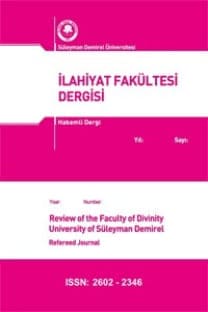THE İMPORTANT OF RELİGİOUS TEXTS AS AN EFFECTİVE MEANS FOR TEACHİNG ARABİC İN TURKEY
This research shows the importance of the religious texts and the benefit from studying it in Arabic language in Turkey. Because of the importance of religious texts for Muslims, there are many words in the religious texts that a new Turk can know because of the interaction between the two languages. Students who learn Arabic are often reading texts such as the Qur'an and hadith, which we call religious text, Therefore words can easily be transferred in the mind of the students, because they were already in their repertoire. Thus we believe that the use of religious lessons such as Qur'an, hadith, fiqh and morality in the teaching and transfer of Arabic will facilitate Turkish language teaching in Arabic.
Anahtar Kelimeler:
nahiv, Qur'an, Hadith, religious text, consumables, nahiv
THE IMPORTANCE of RELIGIOUS TEXTS as an EFFECTIVE MEANS FOR TEACHING ARABIC in TURKEY
This research shows the importance of the religious texts and the benefit from studying it in Arabic language in Turkey. Because of the importance of religious texts for Muslims, there are many words in the religious texts that a new Turk can know because of the interaction between the two languages. Students who learn Arabic are often reading texts such as the Qur'an and hadith, which we call religious text, Therefore words can easily be transferred in the mind of the students, because they were already in their repertoire. Thus we believe that the use of religious lessons such as Qur'an, hadith, fiqh and morality in the teaching and transfer of Arabic will facilitate Turkish language teaching in Arabic.
Keywords:
nahiv, Qur'an, Hadith, religious text, consumables, nahiv,
___
- Ebu Ubied, Kasim ibn Salam, Fada’el el Kuran. thk. Marwan atyaa (şam: Dar-ibn kaser, 1995).
- es-suyuti,celelddin , el-itkan. Thk:mohamed ebu elfadel (Dımaşk: Daru’l-Kalam Tayyib, 1426/2005)
- Buhârî, Sahîhu’l-Buhârî. thk. Mustafa el-Buga. (Şam: Daru’l-Ulûm el-Beşâir, 1413/1993)
- Derviş, Muḥyiddin b. Aḥmed Muṣṭafa, İ‘rabu'l Kur'an ve Beyânuh, Dımaşk-Beyrut, 1415 h.
- El-arabyatu byın yadik ,(Arabıc for all ,Kingdam of Saudi arabia, Riyadh,2015m).
- el-Ezherî, Ebu Manṣur Muḥammed b. Aḥmed, Tehẕîbu’l-Luğa, (Thk. Muḥammed ‘Avaḍ Mu‘rıb), Beyrut 2001, 1. baskı, 1-8.
- es-suyuti,celelddin . el-iktirah, . (Beyrut: Daru’l-kalem, ts. 1989m.
- Ḫalîl b. Aḥmed, Ebu ‘Abdurraḥmân el-Ferâhîdî, Kitabu’l-‘Ayn, (Thk. Mehdi el-Maḫzûmî-İbrahim es-Sâmerrâî), Daru ve Mektebetu’l-Hilal trs., 1-8.
- İbn Abdilber, Câmiu beyâni’l-ilm. thk. Ebû Abdirrahman Fevvâz. (Daru İbn Hazm, 1424)
- İbn Ḥucce el-Ḥamevî, Taḳiyyüddin Ebu Bekr b. ‘Ali b. ‘Abdullah el-Ḥamevî el-Ezrârî, Ḫızânetü'l-Edeb ve Ğâyetü'l-Erib, (Thk. ‘Isam Şeḳıyu), Daru ve Mektebetü'l-Hilal, Beyrut, 2004
- İbn Manẓûr, Muḥammed b. Mukrim b. ‘Ali, Lisânu’l-‘Arab, Beyrut 1414, 3. baskı, 1-15.
- İṣfahânî, Râğıb Ebu’l-Ḳasım Ḥuseyn b. Muḥammed, el-Müfredât fî Ğaribi’l-Ḳur’an, (Thk. Ṣafvân ‘Adnân ed-Dâvûdî), Daru’l-Ḳalem – ed-Dâru’ş-Şâmiyye, 1. Baskı, 1412 h.
- Ḳurtubî, Ebu ‘Abdullah Muḥammed b. Aḥmed, el-Câmi‘ li Aḥkâmi’l-Ḳur’an, (Thk. Aḥmed el-Berdûnî-İbrahim Eṭfeyyiş), Ḳâhire 1384-1964, 1-20 (10 ciltte).
- Mohammed Mamo,laélıul-ımla,(şam,Darl-Yamama,baskı-5,2008).
- Müslim. Sahih-i Müslim.(Riyad:Daru Binti’l-Ahmer ed-Devliyye, 1419)
- Ali El-Cârim, Muṣṭafa Emîn, el-Belâğatu'l-Vaḍıḥa, İstanbul, ty.
- Beyhakî, es-Sünenü’l-Kübra. Riyad: Mektebetü’r-Reşîd, 1425.
- Bolelli, Nusrettin. Belağat (Beyan, Meani, Bedi' İlimleri) Arap Edebiyatı. İstanbul: Marmara Üniversitesi İlahiyat Fakültesi Yayınları, 2001.
- Bolelli, Nusrettin ,Naḥiv Ṣarf ve Terimleri, Yasin yay. İstanbul, 2006.
- Cevherî, İsma‘il b. Ḥammâd, es-Ṣıhah Tacü'l-Lüğa ve Ṣıḥaḥu'l-‘Arabiyye, thk., Ahmed ‘Abdulğafur ‘Attar, Beyrut, Daru'l-‘Ilm li'l-Melâyîn,1987,1-6.
- Ebu Ali İsmail b. Kasım, el-Kâlî, el-Emâlî fi Lügati’l-Arab, Beyrut, 1978, 1-2.
- El-Afgani,saiet, Nahve usolu,;Şam Üniversıtsı,1994.
- El-Câhız, Amr b. Bahr, el-Beyan ve’t-tebyîn, Beyrut, 1423, 1-3.
- İbn Ebi Şeybe. el-Musannef. thk. Mohammed Awama. 2. Baskı. (Beyrut: Dar Cordoba, 1427/2006)
- Şafii,er-Risâle.thk.Ahmed Şakir.(Beyrut:Daru’l-Kuttabel-İlmiye, ts.)
- Zemaḫşerî, Ebu’l-Ḳâsım Maḥmûd b. ‘Omer, el-Keşşâf ‘an Ḥakâiḳ Ğavâmizi’t-Tenzîl, Dâru’l-Kitabi’l-‘Arabî, Beyrut, 3. Baskı, 1407 h. 1-4.
- Yayın Aralığı: Yılda 2 Sayı
- Başlangıç: 1994
- Yayıncı: Süleyman Demirel Üniversitesi
Sayıdaki Diğer Makaleler
MALİKİ NEVAZİL FIKHINDA FURÛUN FURÛA TAHRİCİ
GÜNÜMÜZ YERLEŞİK PEYGAMBER TASAVVURUNUN GENÇ ZİHİNLERDE KARŞILIĞI
EBU’L-BEREKÂT EL-BAĞDÂDÎ DÜŞÜNCESİNDE RUH TASAVVURU
MU’TEZİLE’NİN ORTAYA ÇIKIŞI BAĞLAMINDA DİNÎ ve SOSYO-KÜLTÜREL ÇEVRE
CÜRCÂNÎ’NİN “el-AVÂMİLU’L-Mİ’E” ADLI ESERİNİN BİR FARSÇA MANZUM TERCÜMESİ
Mohammad Shakib ASIM, Nejdet GÜRKAN
ÇERKEŞÎ MUSTAFA EFENDİ VE ÇERKEŞİYYE TARİKATI
الإشكاليات النظرية الناشئة عن الخلط بين الأنظمة القانونية
